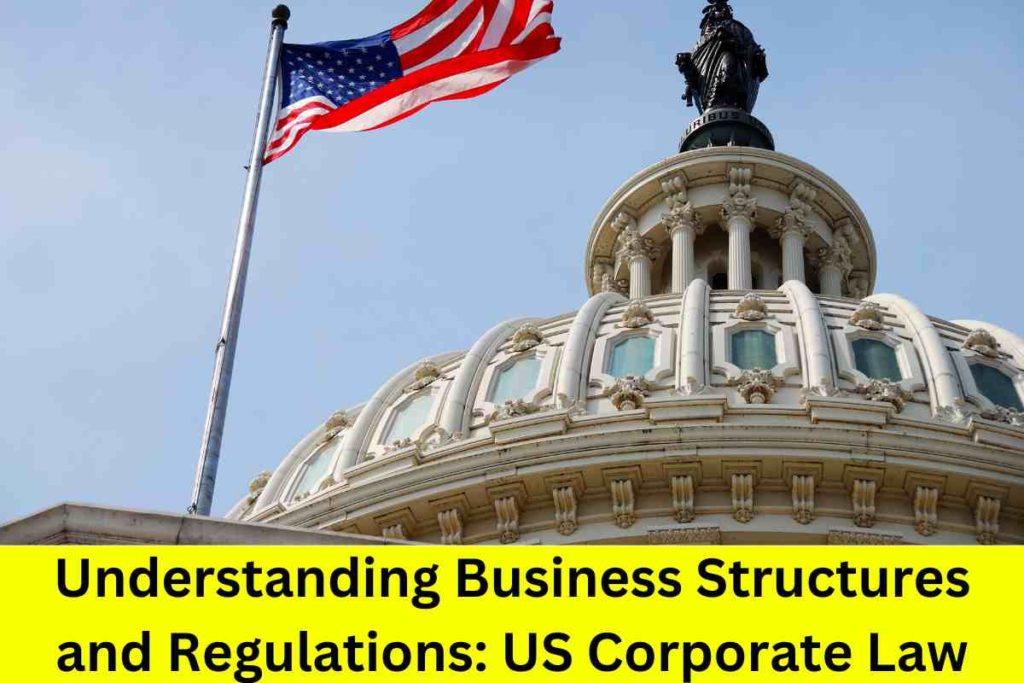Understanding Business Structures and Regulations: US Corporate Law

Understanding Business Structures and Regulations: US Corporate Law: Understanding the legal framework governing businesses is fundamental for entrepreneurs, managers, and investors alike. The US corporate law, with its roots tracing back to the 19th century, lays down the framework for the operation and governance of business entities. The historical background of corporate law reveals a rich tapestry of legal evolution shaped by societal needs and economic trends. The Importance of Understanding Corporate Law cannot be overstated as it directly impacts a business’s functionality, rights, and liabilities. The Scope of Corporate Law encompasses a myriad of areas, including but not limited to business structures, regulatory compliance, and contractual relationships.
Business Structures
The choice of a business structure is pivotal as it dictates the legal responsibilities, tax obligations, and operational dynamics of the business entity. Sole Proprietorships are the simplest form of business entities, characterized by single ownership and unlimited personal liability. The Legal Liabilities associated with sole proprietorships can be overwhelming, thus necessitating an understanding of the legal framework governing this structure. Partnerships come in two primary forms: General Partnerships and Limited Partnerships, each with its own set of legal and operational dynamics. The former entails equal management rights and liabilities for all partners, while the latter provides a shield of limited liability for some. Corporations represent a complex but advantageous business structure with characteristics such as limited liability and perpetual existence. They are further categorized into C-Corps, S-Corps, and LLCs, each offering unique benefits and drawbacks. A Comparison of Business Structures based on Liability, Tax Implications, and Management and Control aids in making an informed decision tailored to the needs and objectives of the business entity.
Regulatory Framework
The regulatory landscape in the US is a composite of Federal and State Laws. At the federal level, Securities Laws govern the issuance and trading of securities, ensuring transparency and fairness in financial markets. Antitrust Laws seek to promote competition and prevent monopolistic practices. On the state front, Formation Laws dictate the processes for the establishment of business entities, while Operation Laws govern the ongoing activities and compliance requirements of businesses.
Corporate Governance
A cornerstone of US corporate law, Corporate Governance revolves around the system of rules, practices, and processes by which a company is directed and controlled. The Board of Directors plays a pivotal role in overseeing the management and ensuring the interests of shareholders are upheld. Shareholders’ Rights and Responsibilities are enshrined in law, providing a framework for shareholder engagement in corporate affairs. Executive Compensation, a topic of ongoing debate, is regulated to ensure fairness and transparency.
Intellectual Property Rights
In an era of innovation, Intellectual Property Rights form the bedrock of competitive advantage. Patents, Trademarks, and Copyrights provide legal protection for innovations, brand identities, and original works respectively, fostering a conducive environment for creativity and investment.
Contract Law
Contracts are the lifeblood of business transactions. Formation of Contracts entails understanding the elements that constitute a valid contract. The Performance and Breach of Contracts delve into the fulfilment of contractual obligations and the legal recourse available in the event of a breach.
Employment Law
Employment relationships are governed by many laws to ensure fairness and equity in the workplace. Employment Discrimination laws seek to promote inclusivity, while Wage and Hour Laws ensure fair compensation for labour.
Environmental Law
With a growing emphasis on sustainable business practices, Environmental Law has taken centre stage. Regulatory Compliance mandates adherence to environmental standards while fostering Sustainable Business Practices promotes a harmonious relationship between business operations and the environment.
International Business Law
As businesses transcend national boundaries, International Business Law becomes indispensable. Trade Agreements facilitate cross-border commerce, while Compliance with Foreign Laws ensures smooth operation in foreign jurisdictions.
Closing Remarks: Understanding Business Structures and Regulations
Navigating Legal Complexities in the realm of US corporate law requires a nuanced understanding and a commitment to continuous learning. The evolving legal landscape necessitates Continuous Learning and Adaptation to ensure compliance and foster a conducive environment for business growth and sustainability.
FAQs: Understanding Business Structures and Regulations – US Corporate Law
- What are the main types of business structures in the US?
- The primary business structures in the US include Sole Proprietorships, Partnerships (General and Limited), and Corporations (C-Corps, S-Corps, and LLCs).
- How does US Corporate Law impact the operation of a business?
- US Corporate Law governs various aspects of a business’s operation, including its formation, governance, contractual relationships, employment practices, and compliance with federal and state regulations.
- What are the key differences between a C-Corp, an S-Corp, and an LLC?
- C-Corps are subject to double taxation, S-Corps avoid double taxation but have restrictions on ownership, and LLCs offer flexibility in management and pass-through taxation.
- How is a Sole Proprietorship different from a Partnership?
- A Sole Proprietorship is owned by a single individual who bears all the legal and financial liabilities, whereas a Partnership involves two or more individuals sharing the responsibilities and benefits of the business.
- What is the role of the Board of Directors in a corporation?
- The Board of Directors oversees the management of the corporation, makes significant business decisions, and ensures the interests of shareholders are upheld.
- How does Intellectual Property Law interact with US Corporate Law?
- Under the umbrella of US Corporate Law, Intellectual Property Law protects businesses’ innovations, brand identities, and original works through patents, trademarks, and copyrights.
- What are the federal and state regulatory frameworks governing businesses?
- Federal laws govern securities, antitrust, and employment, while state laws dictate business entities’ formation, operation, and dissolution.
- How are contracts regulated under US Corporate Law?
- Contracts are governed by common law and the Uniform Commercial Code (UCC), regulating the formation, performance, and breach of contracts.
- What are the key employment laws businesses should be aware of?
- Key employment laws include the Fair Labor Standards Act (FLSA), Occupational Safety and Health Act (OSHA), and Title VII of the Civil Rights Act prohibiting employment discrimination.
- How does Environmental Law affect businesses operating in the US?
- Environmental Law mandates businesses to comply with various federal and state environmental regulations, promoting sustainable and responsible business practices.







1 thought on “Understanding Business Structures and Regulations: US Corporate Law”